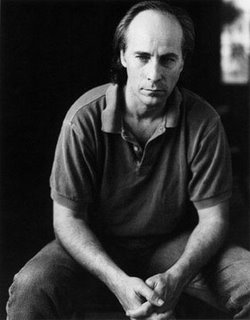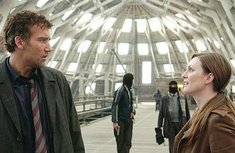Talks: Richard Ford at the Royal College of Surgeons

American author Richard Ford gave a reading from his new book 'The Lay of the Land' at the Royal College of Surgeons tonight. The novel is the third outing for Frank Bascombe, the slightly aimless hero of 'The Sportswriter' and 'Independence Day' and finds him still living in New Jersey, married and preparing for Thanksgiving in the year 2000, a date chosen by Ford to avoid having to write about 9/11, the fact of which he believes fiction can't yet elaborate on or imaginatively explore. He also believes the fault lines in American society were already there before the terrorist attacks and thinks his latest offering reflects this.
The extract Ford read concerned the re-appearance of Bascombe's current wife's ex-husband, a Vietnam vet who vanished thirty years previously and had been pronounced legally dead at the request of his wife. Instead, he had decamped to Scotland to live in various hippie communes before ending up as a gardener for some landed gentry on one of the Hebrides islands. His return is prompted by a web site created by his family appealing for any information on their son; they never accepted his apparent death. Bascombe's reaction to this is to both rail at the absurdity of the situation and to muse on the implications it will have for a marriage that up to then had been lived out in splendid isolation.
There were moments of levity in this but also present was that bleak awareness that though we attempt to fashion, to construct something, underlying this is a fundamental lack of control, an exposure to events.
Ford was introduced by Roddy Doyle who made a tasteless joke about a lover of literature being delighted on hearing the news they had cancer so they could plan what last great book they would read before the end.
The questions after the reading were the usual mixed bag. An extraordinarily pompous American pleaded with Ford to return to the dirty realism of his Rock Springs days while another member of the audience seemed keen to tell Ford the plot of some his short stories. The latter is probably forgiveable as enthusiasm because Ford is a really fine writer; his long twisty sentences seem an accurately represent the ebb and flow of hope and despair that characterise so much of our thoughts
Labels: Literature, Richard Ford, Talks


